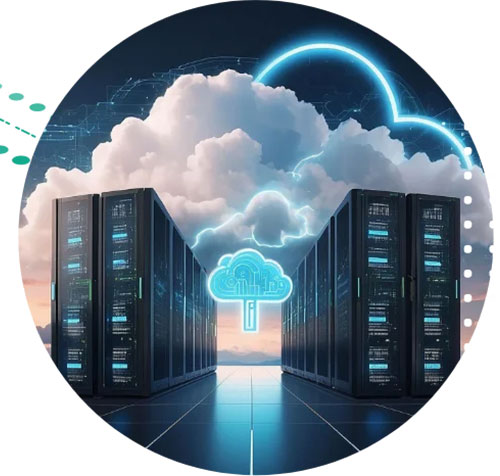What Is Cloud Computing? Benefits, Types & Real-World Applications
Cloud computing in general refers to the delivery of computing resources such as servers, storage, databases, networking, software, analytics, and intelligence over the internet (“the cloud”). Cloud computing allows organizations and individuals to utilize technology resources on demand, with the benefit of scalability, cost-effectiveness, and flexibility.
What Are the Trending Research Areas in Cloud Computing Security?
Cloud computing is one of the hottest trends. Most technological solutions are now on cloud and the ones remaining are vying to be on cloud. Due to its exceptional benefits, it has magnetized the IT leaders and entrepreneurs at all levels.
What is Cloud Computing?
Cloud Computing is when many computers are linked through a real-time communication network. It basically refers to a network of remote servers that are hosted in Data Center, which further can be accessed via internet from any browser. Hence, it becomes easy to store, manage, and process data as compared to a local server or personal computer.
What is Cloud Networking?
The access to the networking resources from a centralized third-party provider using Wide Area Network (WAN) is termed as Cloud Networking. It refers to a concept where the unified cloud resources are accessible for customers and clients. In this concept, not only the cloud resources but also the network can be shared. With Cloud Networking, several management functions ensure that there are lesser devices required to manage the network.
When data began to move to cloud, security became a major debate, but cloud networking and cloud computing security has come a long way with better IAM and other data protection procedures.
Cloud networking and cloud computing security revolves around three things-
- Safeguarding user accounts in the cloud
- Protecting the data in the cloud
- And, then the third aspect is application security.
Trending Research Areas in Cloud Computing Security
Following are the trending research areas in the Cloud Computing Security:
- Virtualization: Cloud computing itself is based on the concept of virtualization. In this process, virtual version of a server, network or storage is created, rather than the real one. Hardware virtualization refers to the virtual machines that can act like a computer with an operating system. Hardware virtualization is of two types: Full Virtualization and Para-Virtualization.
- Encryption: It is the process of protecting data by sending it in some other form. Cloud computing uses advanced encryption algorithms in order to maintain the privacy of your data. Crypto-shedding is another measure in which the keys are deleted when there is no requirement of using the data. There are two types of encryption used in cloud computing security including Fully Homomorphic Encryption and Searchable Encryption.
- Denial of Service: It is a type of attack in which an intruder can make the resources of the users unavailable by disrupting the services of the internet. The intruder makes sure that the system gets overloaded by sundry requests and also blocks the genuine incoming requests. Application layer attack and Distributed DoS attack are some of its types.
- DDoS Attacks: It stands for Distribution Denial of Service. It is a type of Denial of Service attack in which hostile traffic comes from various devices. Hence, it becomes difficult to differentiate between the malicious traffic and the genuine one. Application layer DDoS attack is another type of DDoS attack in which the attacker targets the application layer of the OSI model.
- Cloud Security Dimensions: Software called Cloud Access Security Brokers (CASB) in between the cloud applications and cloud users, monitors all the policies related to cloud security and also enforces the cloud security policies.
- Data Security: The Encryption method is used in protecting and maintaining the privacy of the data because security in the cloud-based services has always been the focal point. Due to some vulnerabilities and loopholes, data might get exposed to the public cloud.
- Data Separation: An important aspect of data separation is the geolocation. Organizations should make sure that the geolocation for data storage must be a trusted one. Geolocation and tenancy are the major factors in data separation.
Cloud is one of the topics with no limit at all. With its help, you can perform any kind of project in order to enhance the performance in speed and magnify the security algorithm so as to prevent the files from being hacked.
Sify allows enterprises to store and process data on a variety of Cloud options, making data-access mechanisms more efficient and reliable.
Cognitive Computing Turning IT Operators into IT Innovators
Cognitive Computing: Turning IT Operators into IT Innovators
We are on the cusp of a new age of computing. One where smart businesses are starting to think differently about how they design, build, and deliver technology solutions. We believe that IT teams need rise up and help drive this innovation.
That’s why we’re collaborating to help our clients apply the power of cognitive insights to transform their businesses. This starts with a perception shift.
Technology as the Job Maker, Not the Job Taker
So much of what you hear about technology today puts technology in the position of job taker. Conversations about which jobs computers and robots will make obsolete pop up frequently in conversations about the future of tech, business, and the economy.
We have advocated version of that view ourselves: Consolidate your servers and reduce the manpower needed to maintain your technology, outsource aspects of your technology as PaaS, SaaS, Iaas, cloud based, and so forth. This kind of efficiency is part of the story. BUT, we’ve worked hard to relay the second half of this story loudly (but maybe not always clearly).
Yes, this takes away tasks from your IT team, BUT it frees them up to focus on more mission-critical IT work.
IT teams have looked at these kinds of statements skeptically. What would their function be if it weren’t maintaining IT operations?
The Cognitive Computing Era
Welcome to the cognitive computing era, where that vision of IT experts focusing on mission-critical tasks is more of a reality than ever. In the cognitive era, technology no longer just supports the business. It BECOMES the business. Your IT infrastructure is the foundation of this, but IT professionals must do more than just keep the machines running. They must embrace the role of business innovator.
According to IDC, line-of-business leaders say that they perceive IT leaders as business innovators more than business operators. Yet, that same study found that IT leaders viewed themselves more as operators. It’s time for that to change.
The I in IT
Business leaders are recognizing that IT needs to be more tightly integrated into the overall business strategy. In order for this to happen, IT needs to be enabled and viewed as more than infrastructure architects.
IT needs to embrace the idea that they can use technology to drive the business forward. They need to throw off the idea that the I in IT just stands for Information. They need to come forward and proclaim that it stands for Ideas, Imagination, Invention—and that the core of all of that is Innovation.
Priming Your Business for the Cognitive Computing Era
In the cognitive computing era, data analytics has been cut from hours to milliseconds. Organizations have the ability to take action on data in real time. Machines are learning in the cognitive era. They’re learning how to help run businesses more efficiently.
None of this is possible without the right IT infrastructure. Today’s machines can understand, reason, and learn. Traditional IT environments work, but to take the leap into the cognitive, you need more.
We believe the core of this is through enhanced capabilities. In the coming weeks, we’ll dive deeper into the following capabilities:
- Analytics Acceleration
- Data Centric Design
- Innovate with Open Technologies
- Choice for Optimization
- Lock Down while Opening Up
- Controlled Iteration at Scale
When these capabilities are wrapped in the core principals of Design for Cognitive Business, Build with Collaborative Innovation, and Deliver through Cloud Platform, business can start to map out a path where IT is innovative.
Subscribe to our blog and hear us out. We’re ready to make the case for an IT team that is more than just the architects of the machines. They’re the architects of a new kind of business.
How Cloud Computing can help SMBs
Most business models followed by SMBs have one common target – minimize costs. When handling big data, storage becomes a problem quite often and there’s a substantial flow of capital just for that purpose.
Cloud offers not just IT infrastructure but a business framework. It’s beneficial for SMBs in terms of accessibility, security, disaster management, cost, time and energy savings, flexibility and gaining an edge over competitors. Using the cloud can significantly bring down physical data storage costs. Furthermore, the ease-of-use makes cloud storage a better option for non-technical people as well. The icing on the cake is the automation that cloud computing supports. Instead of having to invest on IT support, cloud applications update themselves.
Let’s have a look on how cloud computing can help SMBs:
Data Backup
A small business owner should be aware of the importance of backups. System failures can be a risky situation in case of an infrastructure that is still in its nascent stages – something that is common in SMBs. The cloud is a great help here as it breaks down the process by allowing your data to automatically update as you work and also create copies of your data off-site where it will be protected from any looming disaster, theft or accident.
Mobile Office
Due to the cloud’s omnipresence, SMBs can have a better foothold in creating mobile offices. The cloud can be accessed and synced from anywhere and allows you to literally take your office on the road. This brings down the costs greatly by building a working model largely around the internet.
Sharing Info
Sharing data is easier with the cloud due to the ease-of-access. SMBs can now share data across an in-house staff and a team onsite through great distances, instantaneously. Emailing cumbersome files can often slow down work and this is where the cloud comes to play. Moreover, the cloud is also a safer option for sharing data compared to physical means.
File Storage
SMBs need all the marketing they can get for timely expansion and brand recognition. Most direct marketing strategies require large amounts of media that include video, audio and images. Due to the rising access of technology, more and more consumers are accepting this part of promotion. However, all this data can take up a large amount of storage space on a physical server. The cloud can easily take this load off by letting your local server or system focus more on the local files.
Strategic Growth
Cloud computing is a scalable practice and hence enables SMBs to create plans for growth that use the advantages of the cloud without any significant investment. You don’t have to buy new equipment or software, you just pay for what you use. And you get access to the most robust hardware and up-to-date software. Many vendors offer cloud applications for SMBs that enable you to control costs and reduce IT budget, further facilitating staff efficiency and improving productivity immensely.





























































